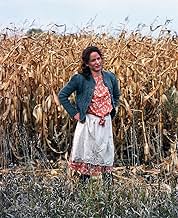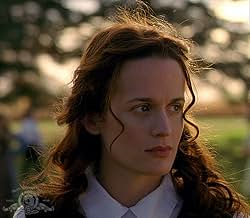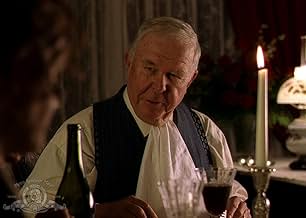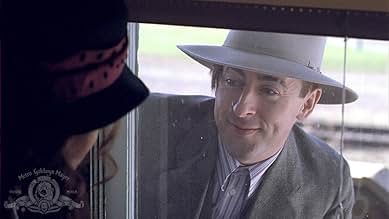CALIFICACIÓN DE IMDb
7.1/10
4.2 k
TU CALIFICACIÓN
Agrega una trama en tu idiomaIn 1920, Inge, a German national, travels from Norway to rural Minnesota for her arranged marriage to Olaf, a Norwegian farmer; bureaucracy and prejudice cause major complications.In 1920, Inge, a German national, travels from Norway to rural Minnesota for her arranged marriage to Olaf, a Norwegian farmer; bureaucracy and prejudice cause major complications.In 1920, Inge, a German national, travels from Norway to rural Minnesota for her arranged marriage to Olaf, a Norwegian farmer; bureaucracy and prejudice cause major complications.
- Premios
- 9 premios ganados y 2 nominaciones en total
- Dirección
- Guionistas
- Todo el elenco y el equipo
- Producción, taquilla y más en IMDbPro
Argumento
¿Sabías que…?
- TriviaElizabeth Reasers' Norwegian pronunciation was so bad that after Dagbladet (one of Norway's biggest news-papers) stumbled upon this film, they posted a clip from it with the title "What is she trying to say?"
- ErroresThey harvest an entire field of corn between the two of them, when they get back to the barn, the crop is suddenly wheat. They go through the whole "separating the wheat from the chaff" process, and pour the seed into sacks.
- Citas
Old Inge: Olaf died, Frandsen.
Old Frandsen: [considering for a moment] No. Olaf is in the fields.
Old Inge: [slowly glancing out the window and remembering]
- Bandas sonorasEskimo Kisses
Music and Lyrics by Thomas Lieberman (as T.F. Lieberman)
Published by Liza Rose Music (ASCAP)
Performed by Thomas Lieberman (as Tom Lieberman)
Opinión destacada
'Sweet Land' manages a difficult feat: it is a historical film with a clear message for the present, yet it avoids becoming either nostalgically cloying or preachily shrill. "Banking and farming don't mix" is not merely a phrase heard several times; it is the key to the confrontation of two utterly different, and utterly irreconcilable, attitudes toward land and life. Ned Beatty, as the chief banker, embodies the one, driven by money and power, harshly and repellently (it's a superb performance), but he and his few allies, and what they stand for, cannot completely overwhelm what most of the other characters, major and minor, believe in and represent: the importance of human connections, with each other and with the jobs they must carry out.
There is scarcely a false step in this film. Elizabeth Reaser brings Inge to life completely believably and very poignantly. We truly care about this woman, a fact made all the more astonishing when we realize that for a sizable part of the film she speaks in languages most of the American audience will not understand. It's one of the best performances I've seen in a long time. Similarly convincing is Tim Guinee as Olaf, her perplexed husband-to-be. His struggles to overcome prejudice (his own and that of his neighbors) are played with a delightful mix of humor, pathos, and inner strength which mirror the complex set of forces with which he must deal. Much the same could be said, albeit on a smaller scale, of the lesser parts; these performers inhabit these roles as if they had already lived them for real. Watch the interactions between Alan Cumming and Alex Kingston, for example; these are two people who are deeply and genuinely in love, but who recognize and accept the flaws of the other. There is no conventional 'happy marriage' insipidity here-- with the result that their marriage comes across as truly happy in a far more profound manner than so many others on screen.
Visually the film is often lovely. It is not as lusciously filmed as Terrence Malick's 'Days of Heaven', with which it shares an underlying approach, but it also avoids the occasional glossiness which undercut the down-to-earth elements of the earlier film's plot. Here the images rarely feel forced, and never overwhelm the intense sense of physical presence so vital to both plot and message. Also powerful is the use of two framing stories, linked to but not dependent upon the central plot. Indeed, the emotional climax of the film actually resides in the contemporary story, something we will not realize until almost the very end of the film. What seems a mere narrative trick suddenly resonates with tremendous power, and brings home the film's central theme beautifully yet without undue emphasis.
The flaws are few. The music, usually vaguely folksy without being especially engaging, is more than once rather too modern in its feel and too diffuse in its impact to support the visuals. The music is the weakest element in the film; at times it sounds almost as if the decision to add music was taken so late in production that all that was possible was some improvisational doodling, which fits neither the delicately shaped mood nor the careful pacing and structuring of the action. The important part of Minister Sorrensen is a bit awkwardly written, with his changes of outlook being rather too sudden; John Heard's performance, though thoughtful, could likewise be more nuanced (he was probably responding to the part as written, but in this case he would have been better off to play against the script).
'Sweet Land' is a beautiful, funny, and often very moving film, with a deep and respectful sense of history and human relations. Both the action and the thoughts it provokes will linger long after the curtain closes. The film has much to offer, and I recommend it very highly.
There is scarcely a false step in this film. Elizabeth Reaser brings Inge to life completely believably and very poignantly. We truly care about this woman, a fact made all the more astonishing when we realize that for a sizable part of the film she speaks in languages most of the American audience will not understand. It's one of the best performances I've seen in a long time. Similarly convincing is Tim Guinee as Olaf, her perplexed husband-to-be. His struggles to overcome prejudice (his own and that of his neighbors) are played with a delightful mix of humor, pathos, and inner strength which mirror the complex set of forces with which he must deal. Much the same could be said, albeit on a smaller scale, of the lesser parts; these performers inhabit these roles as if they had already lived them for real. Watch the interactions between Alan Cumming and Alex Kingston, for example; these are two people who are deeply and genuinely in love, but who recognize and accept the flaws of the other. There is no conventional 'happy marriage' insipidity here-- with the result that their marriage comes across as truly happy in a far more profound manner than so many others on screen.
Visually the film is often lovely. It is not as lusciously filmed as Terrence Malick's 'Days of Heaven', with which it shares an underlying approach, but it also avoids the occasional glossiness which undercut the down-to-earth elements of the earlier film's plot. Here the images rarely feel forced, and never overwhelm the intense sense of physical presence so vital to both plot and message. Also powerful is the use of two framing stories, linked to but not dependent upon the central plot. Indeed, the emotional climax of the film actually resides in the contemporary story, something we will not realize until almost the very end of the film. What seems a mere narrative trick suddenly resonates with tremendous power, and brings home the film's central theme beautifully yet without undue emphasis.
The flaws are few. The music, usually vaguely folksy without being especially engaging, is more than once rather too modern in its feel and too diffuse in its impact to support the visuals. The music is the weakest element in the film; at times it sounds almost as if the decision to add music was taken so late in production that all that was possible was some improvisational doodling, which fits neither the delicately shaped mood nor the careful pacing and structuring of the action. The important part of Minister Sorrensen is a bit awkwardly written, with his changes of outlook being rather too sudden; John Heard's performance, though thoughtful, could likewise be more nuanced (he was probably responding to the part as written, but in this case he would have been better off to play against the script).
'Sweet Land' is a beautiful, funny, and often very moving film, with a deep and respectful sense of history and human relations. Both the action and the thoughts it provokes will linger long after the curtain closes. The film has much to offer, and I recommend it very highly.
- lwalsh
- 22 dic 2006
- Enlace permanente
Selecciones populares
Inicia sesión para calificar y agrega a la lista de videos para obtener recomendaciones personalizadas
- How long is Sweet Land?Con tecnología de Alexa
Detalles
- Fecha de lanzamiento
- País de origen
- Sitio oficial
- Idiomas
- También se conoce como
- Wedding Photo
- Locaciones de filmación
- Productoras
- Ver más créditos de la compañía en IMDbPro
Taquilla
- Presupuesto
- USD 1,000,000 (estimado)
- Total en EE. UU. y Canadá
- USD 1,706,325
- Fin de semana de estreno en EE. UU. y Canadá
- USD 41,860
- 15 oct 2006
- Total a nivel mundial
- USD 1,843,537
- Tiempo de ejecución1 hora 50 minutos
- Color
- Mezcla de sonido
- Relación de aspecto
- 1.85 : 1
Contribuir a esta página
Sugiere una edición o agrega el contenido que falta

Principales brechas de datos
By what name was Sweet Land (2005) officially released in India in English?
Responda

































